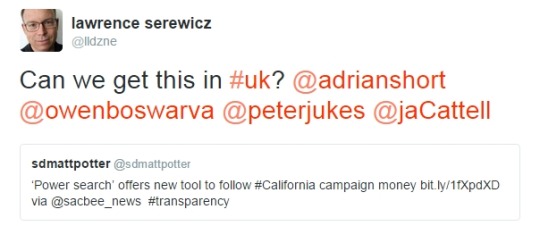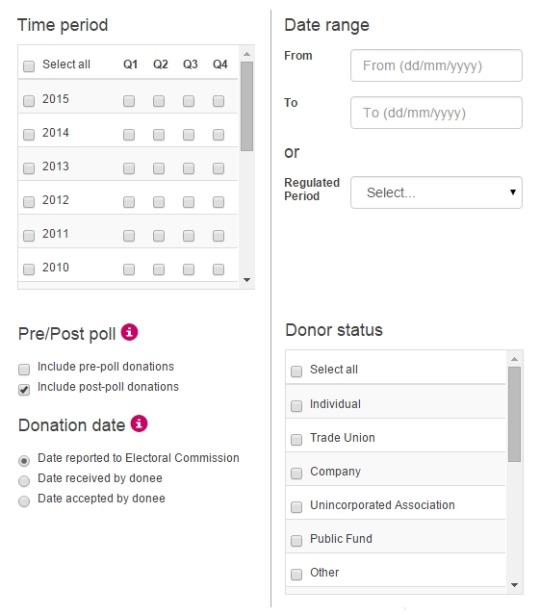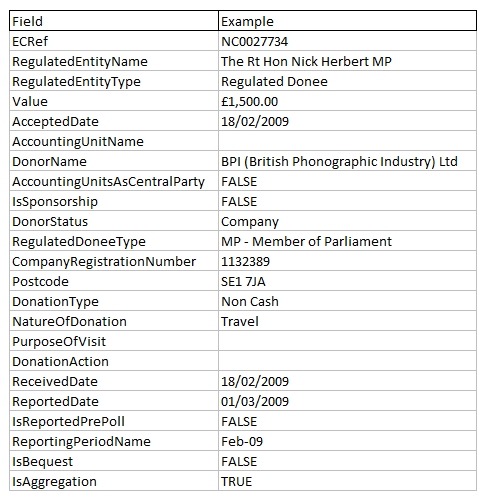
Post: 6 September 2015
Last week on Twitter (from whence all things open data begin) Lawrence Serewicz drew our attention to the launch of Power Search, a new search engine for political campaign contribution data for California, and asked:

As covered by the Sacramento Bee, Power Search has been privately developed by non-profit MapLight in partnership with California’s Secretary of State, and is being presented as an alternative to California’s “confusing” Cal-Access campaign finance website.
Rules around political finance and campaign fundraising in the US and UK are very different. US campaigns for individual candidates are often awash with corporate donations and lobbying, and there are numerous special legal vehicles designed to maximise contributions and make those contributions tax-efficient. In the UK there are more restrictions, overall funding is on a smaller scale, and most funding for individual candidates is channeled through their national parties.
However there’s an argument that whereas in the US donations mainly reflect the broad participation of economic interests in the political process, in the UK donations to individual candidates can tell us something real about their political interests and associations.
Electoral Commission data
In the UK our first port of call for information about political donations is the Electoral Commission, which maintains a searchable database of all donations reported to it since 2001. The search interface is versatile …

… and the search results can be exported as CSV files. In fact pretty much the whole database can be exported as a single CSV, by searching without filters. That means the dataset is proper open data.
When you export the full dataset what you get is more than 50,000 rows of data that look like this:

Not transparent enough? Add more data …
Donation records maintained by the Electoral Commission are a regular source for political journalists, but some people believe party political donations are simply not transparent enough.
One key issue is that donations from individuals can be hard to track because only the donor’s name is published. It would be more transparent if all donors had to provide a registered address and/or declare their affiliations or interests, on the public record.
Even where donors are companies or organisations, there is room for improvement. The Electoral Commission holds addresses for those, and they are accessible via the search interface, but does not release them as bulk open data.
About 54% of donation records include a postcode location for the donor, which means we can do some kind of basic geographic analysis of donations. (Although the registered address of a donor is not necessarily a reliable guide to the geographic scope of their interests.)
About 17% of donation records (20% by total value of donations) include a company address. We can cross reference those records with company registrations in the Companies House Free Company Data Product and also use Companies House’s new search service and API (both in beta) to get details of company accounts and directors. (This data is also available in bulk for free, but at the moment you have to ask for it.)
Beyond donations – related data sources
If the idea is to make it easier to recognise links between political donations and third party influences on policy-making, or on the voting records of MPs, there are some other sources we can look to develop as open data.
In particular we should be pushing for open data release of registers of interest. A couple of years ago I logged a request on Data.gov.uk for open data release of the Parliamentary Registers of MPs’ Interests, Lords’ Interests and All-Party Groups. Cabinet Office subsequently closed the request before any of those datasets were released.
The current position is that the Register of Lords’ Interests is accessible for re-use via the Data.Parliament UK API. It’s not yet available as a bulk download (so is not open data), but if you have the necessary skill you can export the full dataset in bite-size chunks by submitting multiple calls to the API. (This is a neat example of why developers shouldn’t be left in charge of open data strategy.)
A report in January from the Speaker’s Commission on Digital Democracy recommended the Register of MPs’ Interests should be made available as open data by the end of 2015.
The Register of All-Party Groups is currently only available as a collection of HTML pages or a 600-page PDF. This register is a trove of useful information about the subject-matter interests of individual MPs, across party lines. Once the APG data has been made re-usable there is a substantial piece of work there for someone in analysing and visualising the network of links between MPs, industries, foreign interests and so on. (Guardian Data scraped the APG data for several years but hasn’t followed up recently.)
A tool for voters?
Of course these registers of interest only tell us about the associations of our elected (or hereditary or appointed) politicians. The Electoral Commission records on political donations cover both successful and unsuccessful candidates (and parties) at the campaign stage.
Ideally we can enrich those records by linking them to associations gleaned from the registered interests of incumbents, but that leaves us with a comparative deficit of information about the associations of candidates who have not yet held office.
One idea is to require candidates to provide CVs or similar information in a structured format prior to election. This would provide voters with a basis for comparison that takes into account the experience and affiliations of candidates in addition to their persona and stance on policy.
How do we fund and build this?
If we do think there is a need for a new tool or analytic platform that extends the open data we have from the Electoral Commission to give us a more transparency view of political funding, where should that come from? This is squarely within mySociety’s wheelhouse, but we can’t expect them to do everything.
I can’t see the Electoral Commission or Cabinet Office’s Transparency Team funding something like this. Even if the approach is scrupulously non-party political, they are likely to shy away from any attempt to provide tools for investigating (rather than just recording) political donations. On the other hand the goals might be insufficiently entrepreneurial for an InnovateUK voucher or a Kickstarter campaign.
It probably wouldn’t take much though. If anyone is looking for an open data / political transparency flavoured project …